In the dynamic realm of education, in-service physics teachers often find themselves on a quest to balance the demands of the classroom with the pursuit of postgraduate studies. This journey of part-time learning not only enriches their knowledge but also enhances their teaching capabilities. However, juggling these two responsibilities can be a formidable challenge.

Let’s explore some effective strategies to help these dedicated educators navigate this path successfully.
Mastering Time Management
Time management is the cornerstone for physics teachers undertaking part-time postgraduate studies. With the busy schedule of teaching, grading papers, and preparing lessons, finding dedicated time for postgraduate coursework is crucial. One approach is to create a detailed schedule. Allocate specific time slots for each task, whether it’s teaching-related or study-related. For example, set aside a few hours on weekends or early mornings for reading research papers and preparing assignments. Time management tips on Verywell Mind This way, teachers can ensure that they are making the most of their limited time and not neglecting either their teaching duties or postgraduate studies.

Selecting Appropriate Learning Resources
Another key aspect is choosing the right learning resources. In today’s digital age, there is a plethora of materials available for postgraduate students. Physics teachers can take advantage of online libraries, academic databases, and e-books. These resources offer convenience and accessibility, allowing teachers to study at their own pace and from anywhere. Additionally, participating in online discussion forums and virtual study groups can provide valuable insights and opportunities to interact with fellow students and experts. Research resources on LibGuides By carefully selecting and utilizing these resources, teachers can enhance their learning experience and make the most of their part-time postgraduate journey.
Moreover, leveraging school policies can also significantly ease the burden of combining teaching and postgraduate studies. Some schools offer support in the form of study leave, financial assistance, or reduced teaching loads for teachers pursuing further education. Physics teachers should be aware of these policies and actively seek the necessary approvals and support. This not only demonstrates their commitment to professional growth but also allows them to focus more on their postgraduate studies without sacrificing their teaching responsibilities.
In conclusion, in-service physics teachers embarking on part-time postgraduate studies can achieve a harmonious balance between their teaching and learning endeavors. By mastering time management, selecting appropriate learning resources, and making the most of school policies, they can enhance their professional skills and contribute more effectively to the field of education. This journey of continuous learning not only benefits the teachers themselves but also enriches the educational experience of their students.
Readability guidance: The article uses short paragraphs and lists to summarize key points. Each H2 section provides a practical approach. The proportion of passive voice and long sentences is controlled, and transition words are used throughout to enhance readability.


